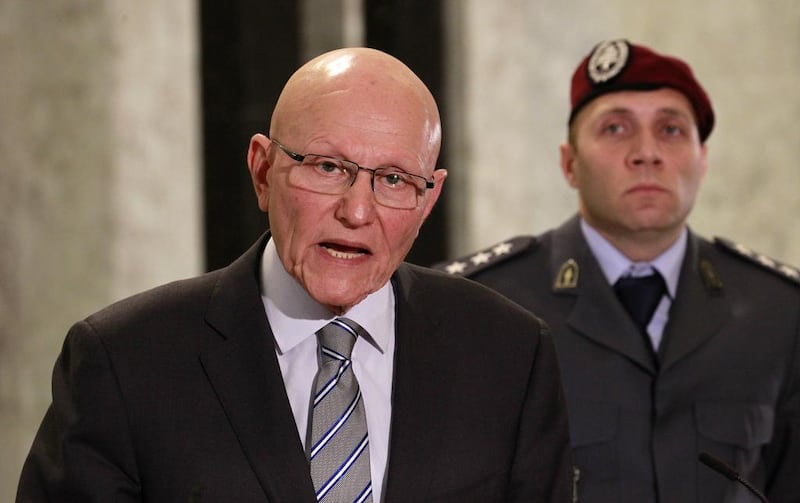BEIRUT // Saudi Arabia said on Friday it was cancelling US$4 billion (Dh14.7bn) in aid that it had pledged to bolster Lebanon’s security forces.
“The suspension came as a result of Lebanon’s positions, which are not in harmony with the brotherly ties linking the two countries,” said an unnamed official quoted by Saudi Arabia’s state-run Saudi Press Agency.
“In light of these facts, the Kingdom has made a comprehensive review of its relations with the Republic of Lebanon, so as to preserve its own interests.”
The official said Lebanon had failed to formally condemn mob attacks on Saudi diplomatic missions in Iran following Saudi Arabia’s execution last month of a prominent Shiite cleric convicted of terrorism charges.
Lebanese prime minister Tammam Salam urged Riyadh to reconsider.
“We express our deep appreciation for King Salman bin Abdulaziz and his brothers in the Saudi leadership ... and we hope for a reconsideration of the decision to halt the aid for our army and security forces,” Mr Salam said.
The Saudi official also blamed the influence of Hizbollah in Lebanon for Riyadh’s decision, denouncing the Shiite movement’s “political and media campaigns” against Saudi Arabia and its “terrorist acts” in the Arab world.
The UAE said it supported Saudi Arabia’s decision, noting that it came after Lebanon “repeatedly took negative, offensive and bizarre positions against pan-Arab consensus”, the official Wam news agency reported.
“Lebanon’s official position has been hijacked and turned against the interests of Lebanon itself and the interests of Arabs,” the Ministry of Foreign Affairs said.
Riyadh’s decision scuttles a $3bn Saudi grant to the Lebanese army to buy weapons from France in a deal that was announced in late 2013. It was to be the largest aid grant to the army in Lebanon’s history.
Also scrapped is a $1bn grant to help the army and police force fight terrorism. That grant was announced in August 2014, just days after ISIL and Al Qaeda’s Syria branch, Jabhat Al Nusra, briefly captured the Lebanese border town of Arsal.
Saudi Arabia’s decision seems to have caught Lebanon’s military off guard.
On Friday morning, local press outlets quoted army commander Jean Kahwaji as saying that Lebanon’s armed forces would receive six A-29 Super Tucano light attack aircraft “soon” as part of the Saudi grant deal.
The grant was seen as a way to strengthen and modernise Lebanon’s chronically weak army at a time when it is facing increasing challenges from the civil war in neighbouring Syria and growing instability at home.
Due to its cross-sectarian nature in a deeply divided country, the army is a rare respected institution in Lebanon. But that respect has been tested in recent years as it has been accused of operating in favour of Hizbollah at times.
Hizbollah’s militia moves across many parts of Lebanon with no interference from Lebanese security forces. The army has increased its presence along Lebanon’s border with Syria to combat extremist groups Al Nusra and ISIL, but Hizbollah forces have remained in the area, taking part in the same fight. Meanwhile, thousands of Hizbollah fighters shuttle in and out of Syria freely to back the regime of Syrian president Bashar Al Assad.
Even as the army turned a blind eye to Hizbollah’s activities, it aggressively moved against Sunni militants in Lebanon who were fighting allies of Hizbollah and Mr Al Assad at home and, at times, crossing the border to join the ranks of Syrian rebels.
For opponents of Mr Al Assad such as Saudi Arabia, the Lebanese army’s actions could be seen as helping to ensure the survival of the Syrian government.
Saudi Arabia’s closest Lebanese ally, Future Movement leader and former prime minister Saad Hariri, said he understood Riyadh’s decision after the “pain” Lebanese foreign minister Gebran Bassil had caused the kingdom – presumably referring to Mr Bassil’s refusal to endorse statements by the Arab League and Organisation of Islamic Cooperation condemning the attacks on Saudi missions in Iran.
Mr Bassil has said he opposed the Arab League statement because it referred to Hizbollah having links to terrorist activities. He said he refused to back the Organisation of Islamic Cooperation statement, meanwhile, in the interest of Lebanon’s neutrality.
Meanwhile, Samir Geagea, head of the Christian Lebanese Forces party and one of Lebanon’s most powerful politicians, blamed Hizbollah for the grants falling through. He urged the Iran-backed movement to stop its “attacks” on Saudi Arabia and proposed that a delegation led by prime minister Salam be sent to the kingdom to ask it to reconsider its decision.
Hizbollah leader Hassan Nasrallah regularly criticises Saudi Arabia and its involvement in Syria, Yemen, Lebanon and other countries in the region. In televised remarks on Tuesday, he accused Saudi Arabia and Turkey of dragging the entire Middle East into war with their proposals to intervene in Syria’s civil war.
The Shiite movement on Friday evening accused Saudi Arabia of supporting terrorism rather than funding it, and claimed Riyadh had cut the military aid because the country is suffering from a financial crisis due to its war against Iran-backed rebels in Yemen, which Hizbollah opposes, and low oil prices.
Last year, Hizbollah had criticised how long it was taking for the Saudi-French deal to produce weapons and suggested that Lebanon’s army turn to Iran for arms instead.
foreign.desk@thenational.ae
* With additional reporting by Agence France-Presse and Reuters





